
*
In a scene added for the movie version of "Hedwig and the Angry Inch," written and directed by stage scribe and star John Cameron Mitchell, Hedwig confronts Tommy Gnosis about messing up the lyrics to a song they wrote together on Gnosis's recording of the song, saying, "We had one version and you [expletive] it up."
While I doubt anyone would say that of Mitchell's adaptation, the sentiment represents a common feeling when cherished works of live performance are permanently recorded (as in movie versions of shows) that the stakes are high to get it right. This is particularly treacherous with movies of stage musicals, as it's necessary to make adjustments in order for a piece to work in the new medium, but every creative choice has infinite capacity to go wrong.
Of course, there's no pleasing everyone and certain things will forever be a matter of opinion. Still, over time, I suppose we hold certain truths to be self-evident. When it was recently reported that Disney's forthcoming film adaptation of Stephen Sondheim and James Lapine's Into the Woods would not include the song "Any Moment," there was such an uproar online that Sondheim himself was moved to release a statement correcting the rumor, clarifying (and assuring fans) that the song will, in fact, be in the movie. I guess right and wrong do matter in the woods.
Click through to read my selections for some of the most altered movie adaptations of stage musicals.
| |
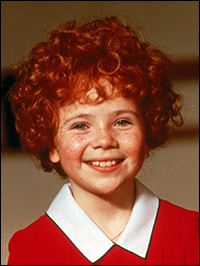 |
|
| Aileen Quinn |
1977 Broadway premiere, adapted into 1982 film directed by John Huston
There is widely-felt distaste for the movie version of the Broadway hit Annie. Fans of the stage show's social commentary and adult sensibility were dismayed by the movie's embracing of the Annie phenomenon as a children's favorite. The film received mixed reviews and was not considered a success in Hollywood. That said, for the generation of kids that came of age around the time of the film's release (and popularity on VHS), the "Annie" movie ranks as an all-time favorite. If Huston and company cut much of what made the show work on stage, like "We'd Like to Thank You, Herbert Hoover" and "N.Y.C.," the refocusing of the plot around Annie, not as the production's cipher tossed from place to place but as a real protagonist, made the character a hero for kids watching and rewatching the video. And if movie audiences missed out on Dorothy Loudon's other-worldly comic genius as Miss Hannigan and Andrea McArdle's voice-of-a-generation belting as Annie, the movie cast was an embarrassment of riches with Carol Burnett, Ann Reinking, Albert Finney, Tim Curry, Bernadette Peters and a host of character actors in the tertiary roles all giving unbeatable performances.
| |
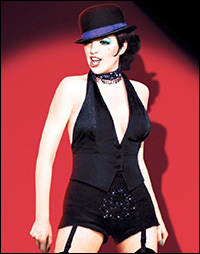 |
|
| Liza Minnelli | ||
| © 1972 Allied Artists-ABC Pictures |
1966 Broadway premiere, adapted into 1972 film directed by Bob Fosse
The landmark Broadway musical Cabaret was drastically altered for its film premiere, making it a landmark movie, albeit in different ways. The Broadway show walked the line between old-fashioned book musical (with people singing songs in character to express themselves, as in "So What," "Perfectly Marvelous" and "It Couldn't Please Me More" and the more contemporary style of musical (where the songs were used conceptually, as in "Two Ladies" and "If You Could See Her Through My Eyes," which are juxtaposed with dramatic scenes to comment on the action). The movie cut all the "book songs" retaining only performance piece numbers set on the stage of the Kit Kat Klub, and adding some more including "Mein Herr" and "Maybe This Time." The story was narrowed to focus on Sally and Cliff (renamed Brian and now a Brit opposite an American Sally, the reverse of the original), with the characters of Fraulein Schneider and Herr Schultz completely eliminated. And while the original stage version vaguely alluded to Cliff's bisexuality, Fosse's film directly addressed it as a major plot point. The movie won eight Academy Awards and was at least as popular as the stage production; revivals of the show have all in some ways emulated various changes made for the film.
| |
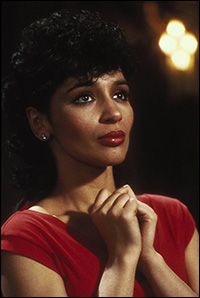 |
|
| Yamil Borges | ||
| © 1985 Metro-Goldwyn-Mayer Studios Inc. All Rights Reserved |
1975 Broadway premiere, adapted into 1985 film directed by Richard Attenborough
Another example of a musicals' plot being narrowed to focus on two of the characters, the 1985 "A Chorus Line" movie is best remembered not at all. Perhaps a great film adaptation of the intrinsically theatrical piece was impossible, but the disaster that was produced surely does not represent the best attempt. Brilliant ensemble material (the heart of A Chorus Line) like "Hello Twelve, Hello Thirteen, Hello Love" was replaced by flashback scenes building up the Zach and Cassie relationship, which sagged under the literalism. Cassie's big song in the movie, "Let Me Dance For You" was the final nail in that section of the coffin and a vastly inferior replacement for (the character's stage number) "The Music and the Mirror."
| |
 |
|
| Beyoncé Knowles |
1981 Broadway premiere, adapted into 2006 film directed by Bill Condon
Michael Bennett's other big Broadway hit (after A Chorus Line), Dreamgirls, received a much happier stage-to-screen transfer, albeit after a 25-year delay. For the millions of fans of the iconic Broadway blockbuster, the hit movie was worth the wait. In an inspired casting choice, superstar Beyoncé brought celluloid star glamour to the role of Deena (based on Diana Ross) to rival perhaps even goddess Ross herself. And if no one could ever touch the legacy of force-of-nature Jennifer Holliday in the role of Effie, former "American Idol" favorite Jennifer Hudson did her predecessor proud with a deeply felt, passionately sung performance that won her the Academy Award. The slight refocusing of the plot to give Deena more weight and more of an arc (and the addition of song "Listen") were smart changes to make this "Dreamgirls" fly on film. The montage of Beyoncé in Hollywood looks during "When I First Saw You" was as magical as any staging could be.
| |
 |
|
| Antonio Banderas and Madonna | ||
| Cinergi Pictures Entertainment, Inc. |
1979 Broadway premiere, adapted into 1996 film directed by Alan Parker
The actual script changes made for the film version of Broadway hit Evita were minimal: a few lines added or removed here or there, and Peron's mistress' "Another Suitcase In Another Hall" was given to Eva. The main challenge in adapting Evita for the screen was that Hal Prince's stage production was a highly presentational, Brechtian affair that presented one metaphor after another. The movie's take was a much more literal, realistic one, and as an experiment in translating modern pop opera sung through storytelling for the screen, "Evita" was an enormous success. Seeing the crowds of thousands rallying for the Perons and expansive cinematography in general added a thrilling historical heft to the piece; and whoever one's choice may have been to play Eva, I doubt anyone else's face could echo Eva Peron's iconic image emblazoned on banners and flags with as much impact as Madonna's. That said, the movie sacrificed a great deal of the stage production's wit and commentary. It's been said that certain elements that were negative toward the Perons had to be toned down in exchange for filming at the actual Casa Rosada in Argentina (under a Peronist government at the time of the filming). This can at least partially explain the bite that was lacking in Madonna's performance but was perhaps the crucial element in the success of Evita on stage.
| |
 |
|
| Topol | ||
| © 1971 Metro-Goldwyn-Mayer Studios Inc. |
1964 Broadway premiere, adapted into 1971 film directed by Norman Jewison
Like "Evita," "Fiddler on the Roof" offers another example of a movie adaption of a Broadway musical where the bulk of the changes were about finding a new storytelling vocabulary for a highly stylized theatrical show. "Wonder of Wonder, Miracle of Miracles," with "Fiddler," the movie is sublime. The substitution of real-life settings (an actual schtetl!) in place of metaphors works perfectly and the great Sholom Aleichen story, as told by Bock and Harnick and Stein, lives on forever in film glory.
| |
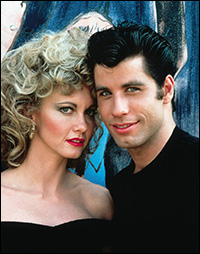 |
|
| Olivia Newton-John and John Travolta | ||
| © 1978 - Paramount Pictures |
1972 Broadway premiere, adapted into 1978 film directed by Randal Kleiser
Broadway megahit Grease was changed drastically for its even bigger hit film adaption. Where the stage show had been a campy, nostalgic sort of parody of 1950s teen culture, the movie became a heightened disco-era fantasia on the teen culture of the 1950s that oddly ushered in the teen culture of 1980s. Almost more stylized and unreal than the stage version, the movie cast actors decades too old for their characters to populate this mythical Rydell High, replacing much of the stage score with actual period pop, relegated (along with some of the stage score) to the background. The stage numbers (and additions) that were kept as key moments became cinematic events, almost more akin to MTV videos than traditional Hollywood musicals, except when the latter genre is being sent up or exploited as a gimmick. The movie "Grease" is a bizarre, somewhat astonishing accomplishment and a completely different experience from the stage show, which hasn't aged nearly as well.
| |
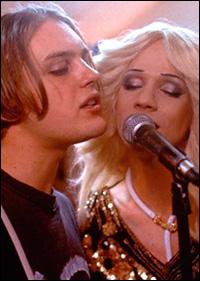 |
|
| Michael Pitt and John Cameron Mitchell | ||
| © 2001 New Line Cinema |
1998 Off-Broadway premiere adapted into 2001 film directed by John Cameron Mitchell
A strange case where the movie version predated the Broadway premiere, Hedwig and the Angry Inch was a long-running hit Off-Broadway years before its recent Main Stem bow. Writer and original star John Cameron Mitchell recreated his role and directed the movie in a feature directing debut. Hedwig is another case where the changes made in adapting the stage version were major, but mostly about finding a new storytelling vocabulary. The stage Hedwig is presented as an environmental cabaret theatre piece where the actual audience forms the audience of a concert being given by Hedwig. The movie opened this up to set each number at a different stop along Hedwig's tour and incorporated background story footage, both in short added scenes and underneath musical numbers. This actually clarified the plot of Hedwig for those unable to make sense of the original due to the loud rock music and artful (but perhaps impenetrable to some) opaque storytelling. The film was well received in its limited release, and I hope that the massive Broadway success the new production will point more people toward a truly excellent contemporary movie musical.
| |
 |
|
1973 Broadway premiere, adapted into 1977 film directed by Harold Prince
Another on the list of notorious stage musical adaption film flops, Pauline Kael wrote in her The New Yorker review of "A Little Night Music," "What was lyrical farce in the Bergman film has now become clodhopping operetta. This picture has been made as if the director (Harold Prince) had never seen a movie." This pan was in keeping with a widespread critical bashing of the film, much of which focused superficially on Elizabeth Taylor's unmoving performance, weak singing and weight fluctuation. There are other weird things about the adaptation, like strange renaming of characters, but probably the worst thing about it Prince's direction, inappropriately stagey in how the film is contextualized at beginning and end as a chamber presentation behind a curtain and with long talky scene shot and edited with little empathy for the viewer. That said, there are some effective sequences, including the completely rewritten "The Glamorous Life" (as a solo for Fredrika) — a very welcome new Sondheim song — and both (the somewhat rewritten) "Every Day A Little Death" and "A Weekend in the Country." Actually, anything Diana Rigg does as (the renamed) Charlotte Mittelheim is gold.
| |
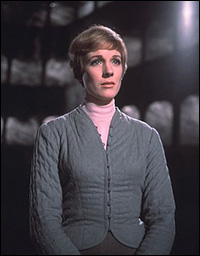 |
|
| Julie Andrews |
1959 Broadway premiere, adapted into 1965 film directed by Robert Wise
Another gargantuan Broadway hit adapted into an even more successful movie, this also another example of the way secondary characters are often cut back to focus the movie version of stage show on the leads. While Max and Elsa are still in the movie, they sacrifice their songs, "How Can Love Survive?" and the political "No Way To Stop It." Other songs are repurposed, such as "My Favorite Things" being switched from a Maria-Mother Abbess song at the Abbey to a Maria-children number in Maria's room. It replaces "The Lonely Goatherd," which becomes a puppet show put on by Maria and the children after "Do Re Mi," solidifying their connection. There are also added solos for Maria, "I Have Confidence" and "Something Good," all of which serves to focus the movie on Julie Andrews as Maria, which is a good thing.
(Ben Rimalower is the author and original star of the critically acclaimed Patti Issues, currently on a worldwide tour. Read more about the solo show here. Visit him at benrimalower.com and follow @benrimalower on Twitter.)









